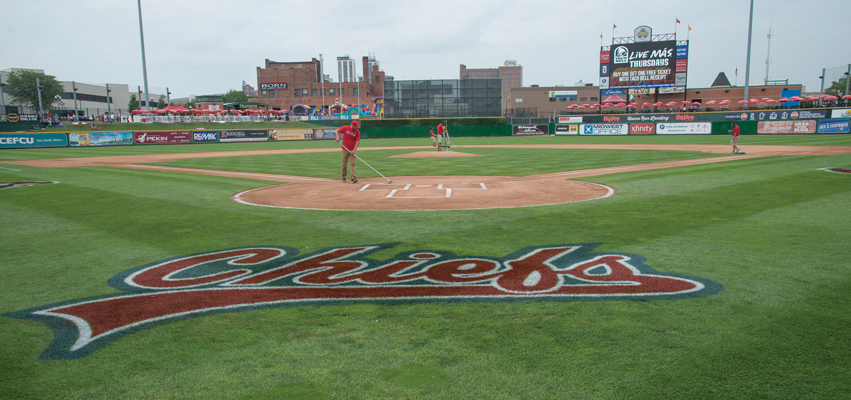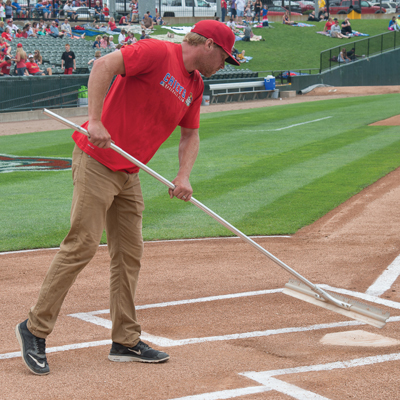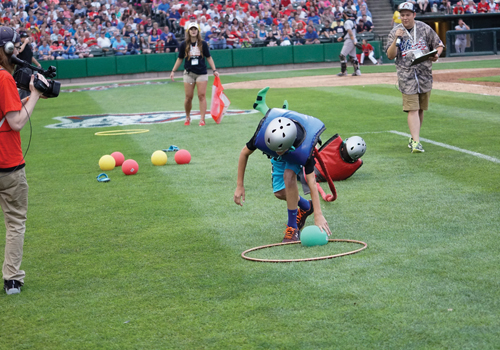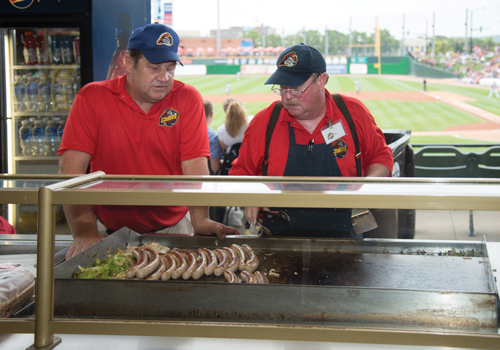
Find out what it really takes to "take me out to the ballgame…”
Baseball. It’s known as America’s favorite pastime, and it certainly has a rich history in central Illinois. While the team has changed affiliations and venues over the years, our Peoria Chiefs have entertained area fans and families since the early 1980s. But hosting more than 70 Class A baseball games each season at Dozer Park is no easy feat: minor league baseball requires some major-league effort.
It’s Not About the Game…
As ironic as it may seem, the Chiefs' office holds no responsibility for the players or the game itself—that falls to the team’s major league affiliate, the St. Louis Cardinals. It’s an interesting dynamic to balance. There are about 25 individuals on the roster at any given time—players who have been drafted by the Cardinals out of high school or college, or as free agents.
They come from cities all over the United States to as far away as the Dominican Republic, Venezuela, Taiwan, Australia or France. They are paid by the Cardinals organization, and baseball is their full-time job. The goal is to work their way up that ladder to ultimately play at the major-league level.
“We have no say in who our players are—the lineup or the coaching staff,” explains Rocky Vonachen, president of the Chiefs organization since 1996. “Anything that happens on the field is handled by the Cardinals. We are here to provide them with a venue to develop their players.” Preparing that venue is where the real work lies.

Prepping the Field
Usage of Dozer Park is heavy during the season. In addition to their own games, the Chiefs prepare the field for Bradley University’s baseball team, which also hosts home games at the stadium. And when you count state high school tournaments—which can mean maintaining the field for multiple games in one day—it adds up to a lot of wear and tear. "Basically from the beginning of April to mid-May, there’s somebody on this field every day," notes Vonachen, "and it's tough on the turf." That’s where head groundskeeper Mike Reno comes in to work his magic.
He certainly knows what he is doing. Before coming to Peoria, Reno readied playing surfaces for the Florida Marlins, Miami Dolphins, Miami Hurricanes, Washington Redskins and Arizona Cardinals. In the off-season, he works as one of 30 NFL groundskeepers for the Super Bowl, and travels to Mexico, Germany and England for NFL Europe. While major universities now offer landscaping and groundskeeping degrees, Reno started working before that was an option. His 15 years of experience is—quite literally—in the field.
Reno heads up a grounds crew of seven seasonal employees. The outfield is mowed using an oversized riding mower, similar to what is used on golf course fairways, while the infield is cut by hand with a unit similar to a greens mower. It takes roughly an hour and a half to cut the turf to its perfect height of one inch. A roller at the back of each machine bends the blades of grass in interchanging directions, giving the ballfield its patterned look—an alternating bend which can actually affect how the ball bounces.
Vonachen labels Reno a turf artist and is quick to point out his talents. “He does most of his work freestyle, without guides or markers. He once cut a wave pattern into the field, and depending on where you were sitting in the park, it appeared to be rippling.”
The vastness of the lush, patterned outfield contributes to a common misconception. “Everybody thinks groundkeepers are usually mowing,” explains Reno, “but 75 percent of our job is dirt work. The infield is ripped up every game, but players like it to be as flat as possible so there are no bad ball hops.” Reno and his team spend significant time rolling, watering and dragging the clay surface to remove clumps before finally chalking in the lines. Reno also paints logos on the field before each game. A stencil is laid out and outlined with dots, which are then connected with the correct colors. “It's just like a children's coloring book,” he notes.
Despite the challenges presented by Mother Nature and the long hours, the head groundskeeper speaks highly of his job. “The things I love most are working outside and the reward of a beautiful field at the end of the day.”

Getting Folks In
Without fans in the stands, it wouldn’t make financial sense to operate a ballpark, so the majority of staffers at Dozer Park focus on ticket sales. A team of three full-time account reps and four inside sales reps work to sell season tickets, group visits and corporate outings for the following year almost as soon as the current one wraps up. And the staff is highly qualified.
The level of experience in the front office is vast—ranging from AAA to Major League Baseball and even the National Hockey League. The team is able to use this network to recruit staff to the Chiefs’ front office, capitalizing on their experiences in larger markets in major cities.
On game days, half a dozen employees are working at the ticket windows, with the same number at the gates. Depending on attendance, there are 15 to 20 ushers, eight Kids Zone attendees, and additional workers in the team store and guest services. When you figure in security, interns and contracted concession/food service workers, there can be nearly 200 individuals on the payroll for each game. From an economic development standpoint, this has a real impact.
"We employ about a dozen full time employees," states Vonachen, "but the seasonal work the ballpark provides to people—whether they are hired directly or through one of our contracted vendors—provides income for students, retirees and schoolteachers."
Entertaining the Fans
No matter how crazy fans may be for the game, baseball is still a stop-and-go sport. Pitching substitutions, field changes and batter warm-ups all take time, and filling these gaps is a significant part of the overall experience. "Minor league baseball can do a lot of things they can’t do at the major-league level; that’s where the entertainment aspect comes in," notes Vonachen. "We don’t have the big-name stars, so it’s really the entertainment that people come out for."
And the activity schedule for each game fills a multi-page spreadsheet. From who's singing the national anthem to the “Hero of the Game,” there are lots of boxes to tick off when planning. Staff must coordinate any special promotions or giveaways for the night, themed evenings, media sponsors, participants in the "high five" tunnel, and birthday and anniversary announcements on the digital board. One major draw is the post-game fireworks shows that cap off the night for fans 20 times a year, while dueling pianos and Star Wars theme nights means there’s something for everyone—even if you don’t like baseball. The ideas is to create memories to pique interest and get people from different backgrounds out to the ballpark.
Perhaps some of the most fun things to watch are the silly fan challenges, dances and other activities implemented by game-day staff and interns. While many of these ideas come from brainstorming sessions, they may also be "stolen" from other teams. "Other minor-league teams aren't our competitors, so we share ideas all the time," Vonachen admits. "At the end of the season, we have a league meeting and part of that is reviewing best practices: what worked and what didn't from a marketing and operations standpoint."
Although interns may spend some of their summer conducting dizzy-bat competitions or demonstrating the funky-chicken dance, they do participate in all areas of the operation, from marketing, promotions and community relations to video production and broadcasting. There are six paid interns per season, usually from local schools like Bradley or Illinois State University. "We look for people who are really outgoing, fun people because they will be interacting with the fans," remarks Vonachen. "But we're also looking to their young, creative minds for new ideas."
Finally, the Chiefs are big proponents of allowing local organizations the chance to gain exposure and raise funds through the ballpark. "We want to give back to the community, so we welcome nonprofit groups through Pitching for Charity, working concession stands for a portion of proceeds, or conducting jersey auctions," Vonachen notes. "When you tie all these activities together, the amount of money that goes back to the nonprofits is $100,000-plus over the course of the season."

Feeding the Masses
For many fans, it just isn't a ballgame without a mustard-slathered dog, plate of nachos or an ice-cold brew. The task of filling these cravings falls to Professional Sports Catering (PSC), the Chiefs' exclusive concessionaire since 2010.
PSC operates five fixed concession stands, plus a dozen mobile carts around the park that serve everything from banana splits and burritos to Philly cheese and craft beers. MaryBeth Milburn, Director of Food and Beverage for PSC, says this greater variety of foods really appeals to the crowds, but that doesn't mean the old standards don't sell well. "Our Education/Kids Days are pretty busy and keep our staff moving, that’s for sure," she reports. "We start off by cooking and wrapping over 2,000 hot dogs... and we cook more as the game progresses. That is a lot of hot dogs!"
"Popcorn is something we pop fresh during the game as well,” she continues. “On any game day, we can pop anywhere from five to 100 pounds of popcorn seeds—which is a lot of popcorn tubs!"
The vendor also sets up food for group outings in concourse party areas, party decks and luxury suites. The full-service kitchen is run by a full time executive chef, who specializes in creating items that suit the tastes of party-goers and suite holders. "We boast about chef’s beef brisket, pulled pork, buffalo chicken dip and our Peoria secret: Rocky fries [waffle-cut fries with Monterey Jack cheese, candied bacon and blue cheese crumbles—a favorite of the Chiefs’ president]. And of course, desserts like tiramisu, chocolate mousse cake, and chocolate turtles as big as your hand."
PSC employs about 150 part-time, seasonal employees in a variety of capacities—everything from prep/line cooks, picnic servers and concession stand managers to bartenders, cash attendants and hawkers who dispense cotton candy, peanuts or beer to the fans in the stands. In addition to Milburn and the executive chef, the full-time management team includes a catering manager, picnic manager, concessions supervisor and operations manager. Their jobs extend beyond the baseball season, too. "We can handle it all," she explains, "everything from a pre-game seminar or picnic in the outfield to a class reunion, business meeting or a wedding rehearsal dinner."
 Maintenance and Cleanup
Maintenance and Cleanup
Maintaining and cleaning the facility, which encompasses two city blocks, takes a team effort. At capacity, about 7,500 fans can watch the games from the variety of seating options available, which means quite a bit of cleanup work for VSI, the Chiefs’ vendor for janitorial services. The bulk of the work lies in tidying up the 7,000 green folding seats and cup holders. The crews come in right after a game or the following morning and walk row by row, retrieving napkins, beer cups, wrappers and the other debris that accumulates over the course of nine innings.
And what about all the popcorn and cracked peanut shells that scatter along the concrete floor? Workers actually use a leaf blower to push them to the end of the row before sweeping them up. In addition, cleaning crews are sent upstairs to tidy all the guest suites, and along the concourse and outfield areas to remove trash and empty receptacles. In all, it takes a crew of four to six anywhere from three to six hours to complete the job.
Of course, thousands of fans also require adequate bathroom facilities. With six restrooms in the concourse and suite areas, two in the outfield and office, plus the clubhouse and locker rooms, Dozer Park boasts a bounty of commodes. During games, porters attend to all these areas to remove trash, refill toilet paper and attend to other maintenance issues.

When the Games Are Over…
Although game days are long—14 to 16 hours on average—Dozer Park employees are passionate about what they do. It could be a 100-degree home game, with staff sweaty and tired after a long day, but when they are standing at the gates, shaking hands and thanking people for coming, it’s all worth it, declares Vonachen.
"Minor league baseball is all about fun, affordable family entertainment," he says, "and while we are here for the sport of baseball, about 90 percent of the people here have no idea who our players are. They are here to have a good time with family, friends, neighbors and co-workers. And when they do? They’ll come back."
Vonachen recalls talking about this with his father, the late Pete Vonachen. "Dad and I used to say that 75 percent of the people had no idea whether the Chiefs won or lost when they walked out… and maybe didn’t even care. If they had a good time, they’d come back. So it's our job to provide that experience."
At the end of the season, the team is already thinking about making next year even better. "A common misperception is that when the games wrap up, the staff is left with nothing to do," Vonchen says with a chuckle. “We maybe take a week off, and then we’re right back at it, gathering sponsorships, selling tickets and suites, scheduling promotions and all that. There's a lot of work to do before next season's first pitch is thrown out." iBi

